Key takeaways:
- Pro-life advocacy emphasizes the value of life through support for mothers and families, extending beyond the abortion debate to promote a culture of life.
- Open discussions encourage empathy and understanding, allowing individuals to share personal experiences that bridge differing beliefs, fostering a supportive environment.
- Engaging in dialogue that addresses emotional stakes and uses reflective statements enhances mutual respect and transforms contentious conversations into meaningful exchanges.
- Personal narratives and vulnerabilities play a crucial role in building connections, encouraging participation, and humanizing complex issues within pro-life discussions.
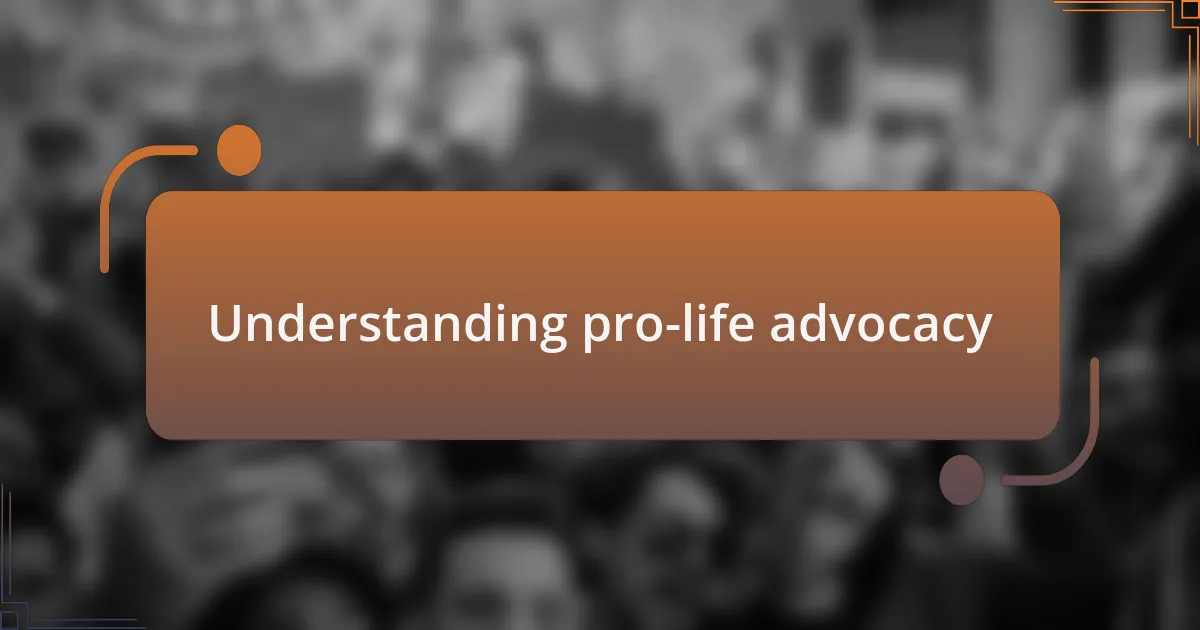
Understanding pro-life advocacy
Pro-life advocacy centers around the belief in the value of life from conception until natural death. I remember attending a local discussion where a mother shared her experience with an unplanned pregnancy. Her story highlighted the complexity of choices and the deep emotional connections to unborn life, which really made me reflect on how vital these conversations are.
At its core, pro-life advocacy isn’t just about opposing abortion; it’s about promoting a culture of life that respects and values all human beings. I often think about how dialogue on this topic can shape perceptions. Have you ever considered the impact of sharing personal stories versus just presenting statistics? Personal narratives can create a bridge of understanding that pure data often fails to achieve.
The movement also emphasizes support for expectant mothers and families, advocating for resources that help them thrive. I recall meeting a wonderful group that provided practical assistance, such as prenatal care and parenting classes. Watching the transformation in those families reminded me that pro-life advocacy extends far beyond the conversation about abortion; it’s about nurturing life in every form.
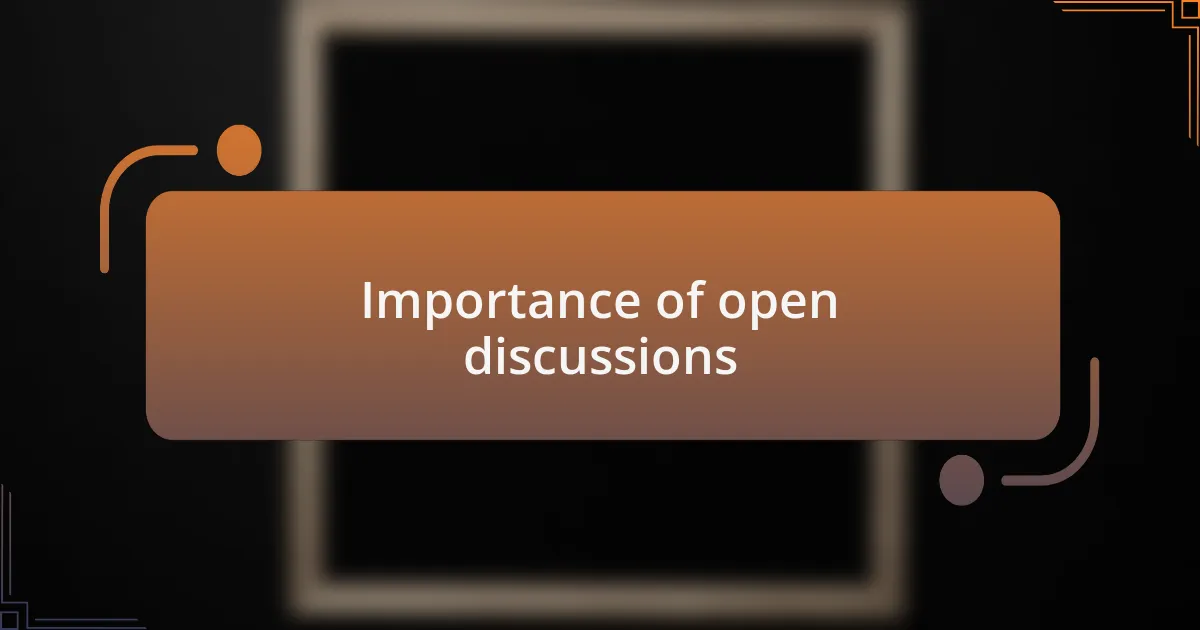
Importance of open discussions
Open discussions play a crucial role in fostering a deeper understanding of pro-life issues. I recall a debate I attended where participants shared divergent views, and what struck me most was the initial discomfort in the room. But as conversations progressed, that tension transformed into a genuine exchange of ideas. I realized that creating a safe space for open dialogue encourages people to explore their beliefs and possibly reevaluate them.
I’ve personally witnessed how open discussions can dispel misunderstandings and stereotypes surrounding the pro-life movement. For instance, during a community forum, a young woman shared her anxiety about her pregnancy, and the attendees responded with compassion rather than judgment. This experience made me appreciate how conversations can bridge gaps and foster not just awareness, but empathy. Isn’t it fascinating how a single conversation can change someone’s perspective?
Moreover, open discussions allow for the prioritization of support over division. I remember a collaborative workshop where pro-life and pro-choice advocates came together to discuss common goals like maternal health. By acknowledging shared values, we found a pathway toward mutual respect, which reminded me that at the heart of these discussions is a collective desire for a better future. How can we, as advocates, ignore the power of respectful dialogue when it holds the potential to unite for a cause greater than ourselves?
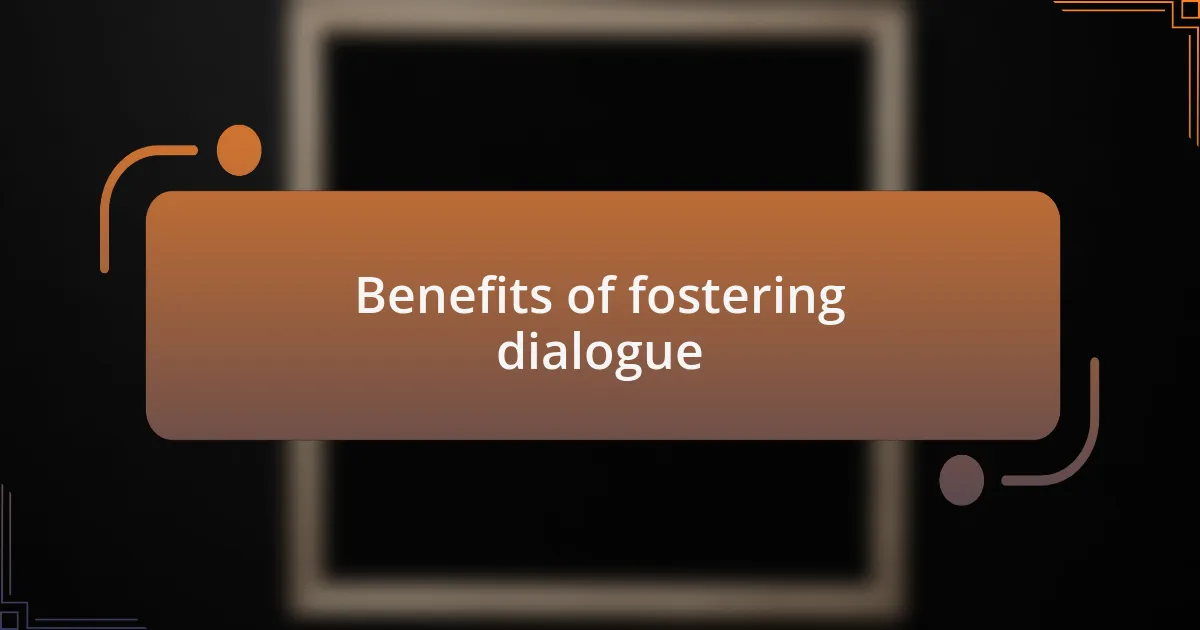
Benefits of fostering dialogue
Engaging in open dialogue opens multiple avenues for understanding and growth. I remember a time when I co-hosted a discussion group where pro-life advocates shared personal stories. Those narratives not only brought our shared mission to life but also highlighted the human experiences behind the policies. Isn’t it incredible how personal narratives can dissolve barriers and foster empathy?
Through my experiences, I’ve observed how dialogue can transform misconceptions into a shared understanding. During one forum, I was struck by an opponent who, after hearing direct testimonies from women who chose life, began to question their own previously held beliefs. This moment made me reflect on how powerful it is to provide a platform for voices that often go unheard. When was the last time you truly listened to someone with an open heart?
Fostering dialogue strengthens relationships within the community. After a series of discussions, I noticed that participants were not only more informed but also more compassionate toward one another. The friendships that blossomed from these interactions were inspiring. Isn’t it rewarding to see how honest conversations can create a supportive environment for everyone involved?
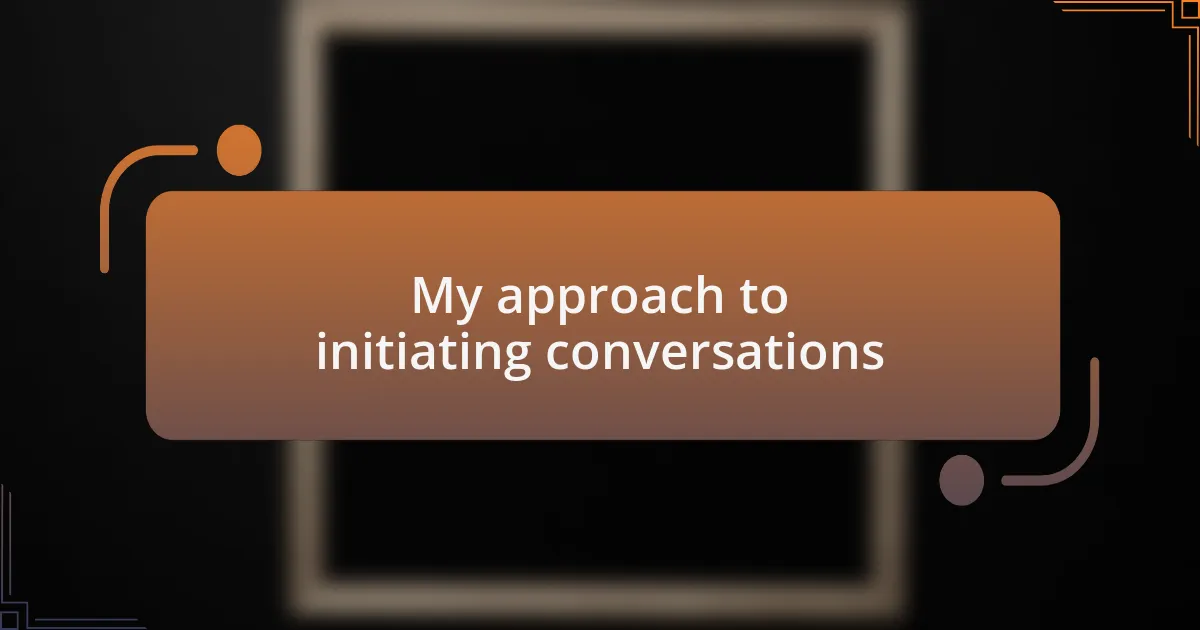
My approach to initiating conversations
When initiating conversations, I often start by asking open-ended questions that invite others to share their perspectives. For example, during a recent meeting, I asked a participant what influenced their views on life issues. This simple question not only sparked a meaningful exchange but revealed underlying emotions and experiences that shaped their beliefs. It’s amazing how a few carefully chosen words can create an atmosphere where everyone feels comfortable contributing.
I prioritize active listening as a core part of my approach. I recall a moment at a community event when a young mother shared her struggles with an unplanned pregnancy. Instead of jumping in with my viewpoint, I focused on her story, reflecting her emotions back to her. This not only deepened our connection but encouraged others to speak up as well. Have you ever noticed how people are more willing to open up when they feel genuinely heard?
To ensure everyone feels included, I often set ground rules that promote respect and understanding. One time, I facilitated a discussion where we established that all voices matter, regardless of differing opinions. This framework allowed participants to engage more freely without fear of judgment. Isn’t it fascinating how creating a safe space can unlock rich dialogue and foster mutual respect?
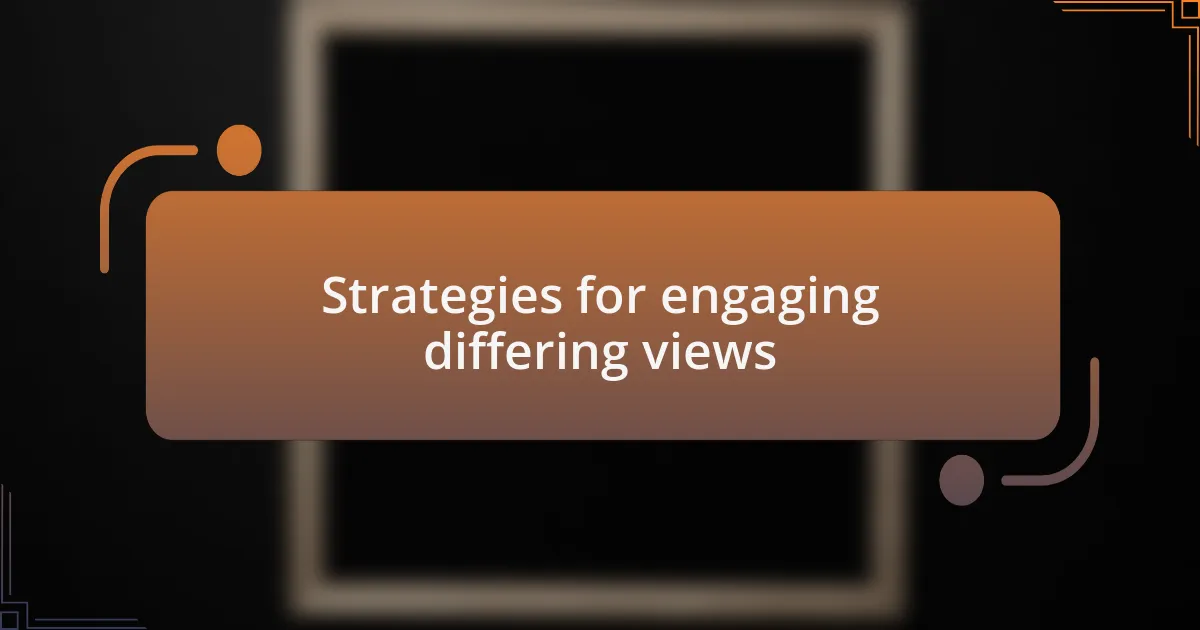
Strategies for engaging differing views
One effective strategy I’ve found is to encourage participants to share personal stories related to their beliefs. Just last month, at a discussion group focused on pro-life issues, a participant shared how their experience with infertility profoundly shaped their views. Hearing their journey created an emotional connection that shifted the conversation from abstract principles to real-life implications. It made me realize that personal narratives can often transcend ideological divides, prompting a more compassionate dialogue.
I also advocate for the use of reflective statements to help clarify what others are expressing. In one instance, when someone voiced a seemingly extreme opinion, I paraphrased their point and asked if I was capturing their feelings correctly. This not only demonstrated that I was engaged but also provided them with the opportunity to elaborate or shift their perspective. Have you ever seen how this simple technique can lead to a deeper understanding? It turns an argument into a conversation.
Lastly, addressing the emotional elements of the discussion is crucial. During a recent town hall, I felt the tension as people shared conflicting viewpoints. By acknowledging the emotional stakes involved, I asked everyone to consider how their opinions affect not just the issue at hand, but also the individuals behind the statistics. I noticed that this approach invited introspection and softened the atmosphere, making space for empathy. Isn’t it interesting how a bit of vulnerability can change the tone of a conversation?
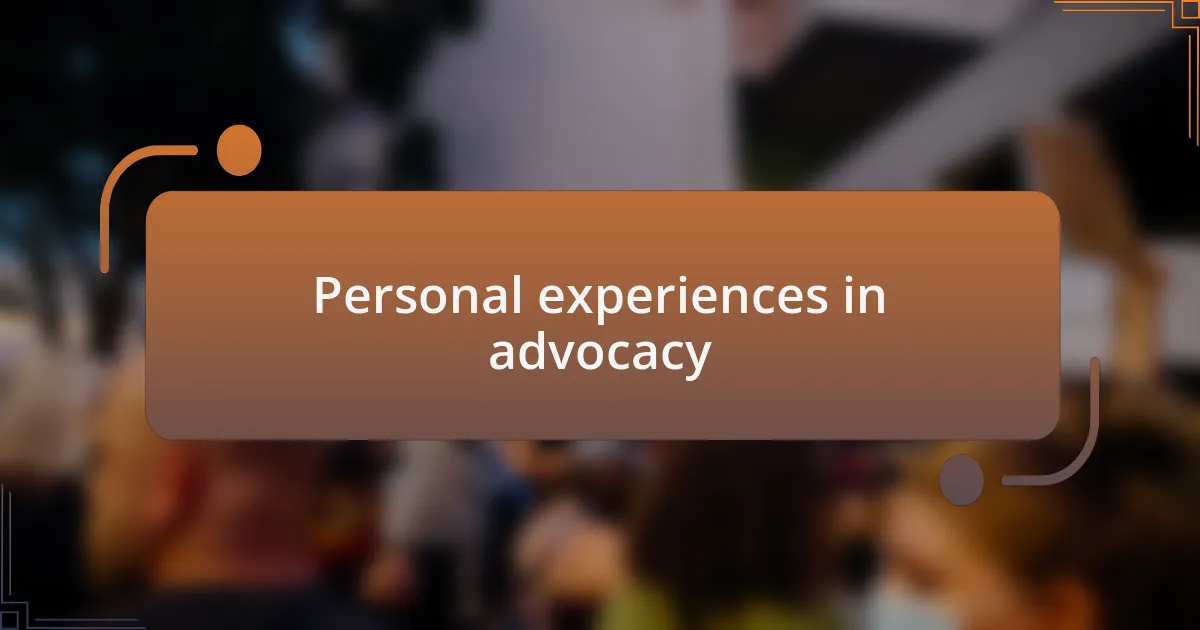
Personal experiences in advocacy
In my journey within pro-life advocacy, I’ve found that open discussions are often sparked by sharing our own experiences. For example, I once recounted a time when I accompanied a close friend through a challenging pregnancy. This personal narrative not only resonated with others in the room but also encouraged them to share their own stories, creating a safe atmosphere where everyone felt understood. Have you ever noticed how vulnerabilities can act as bridges in discussions?
On another occasion, during a community event, I was surprised to hear a woman speak passionately about her past decisions regarding pregnancy. Her honesty about her struggles and regrets brought an unexpected depth to the conversation. I realized then how critical it is to create a space where individuals feel they can safely express such intimate aspects of their lives. It reminded me that the more we share, the more we humanize the issues we discuss. Isn’t it fascinating how personal truths can elevate a dialogue?
I also remember a particularly challenging forum where participants were clearly divided on their beliefs. I decided to share my own uncertainty during certain moments of my advocacy. By acknowledging my hesitations, I emboldened others to reveal their doubts, too. This act of vulnerability transformed our debate into an enlightening exchange of ideas, breaking down barriers that often hinder open discussions. Don’t you think that embracing our uncertainties can foster a sense of community and understanding?
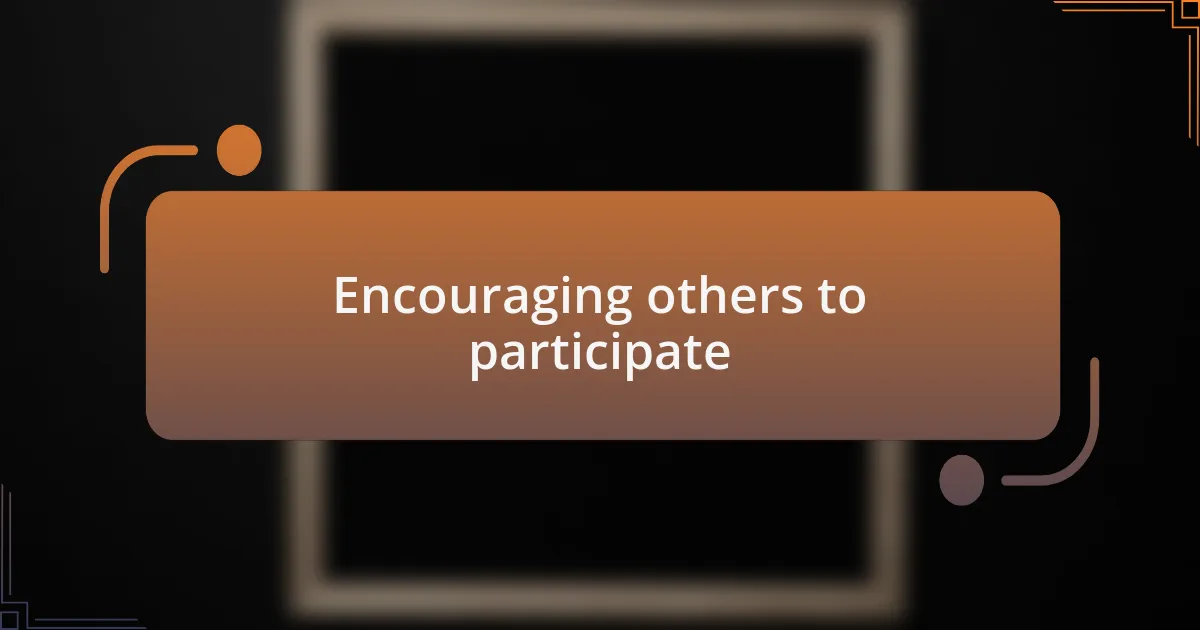
Encouraging others to participate
Encouraging others to participate in discussions can sometimes start with simple gestures. I recall attending a local pro-life gathering where I made it a point to actively listen to those around me. By nodding, smiling, and occasionally tapping into their stories with follow-up questions, I noticed how the atmosphere shifted. People began to feel comfortable voicing their thoughts, and it made me wonder: What small affirmations could we provide to cultivate a welcoming environment?
I remember a time when I organized a small workshop focused on the importance of open dialogue. To kick things off, I invited participants to anonymously write down their feelings about specific aspects of pro-life advocacy and share those statements aloud. The nervousness in the room soon transformed into a cascade of shared thoughts. It struck me that giving people a voice without the weight of judgment can ignite a powerful discussion. Have you ever seen how anonymity encourages people to step beyond their comfort zones?
In another instance, I took a different approach by initiating a “story circle” on social media, where participants could share their experiences through brief video clips. Each submission sparked engagement from others, and soon, a community formed around these shared stories. It was inspiring to see how easily individuals gravitated towards contribution when they felt their voices mattered. Have you ever found that sometimes a new platform is all it takes to inspire involvement in a conversation?